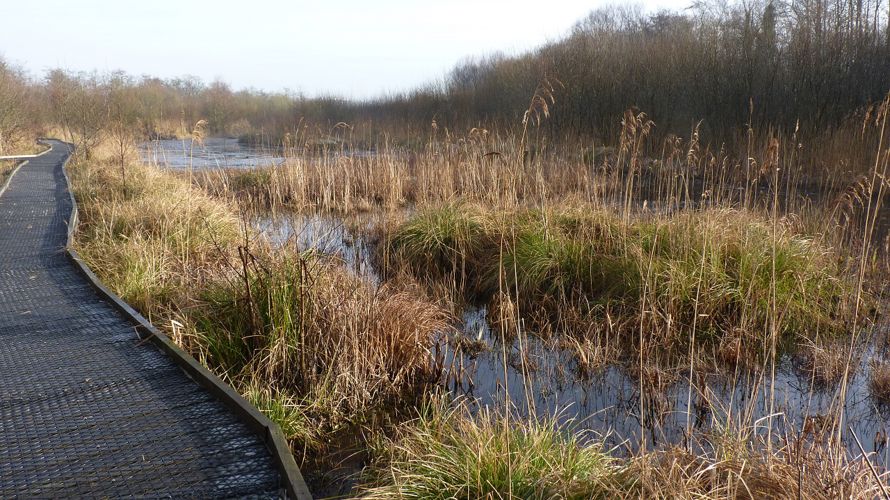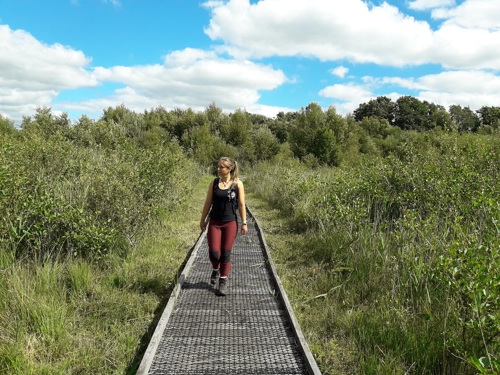Afan Forest Park – Visitor Centre, near Port Talbot
Main starting point for mountain bike and walking...

Crymlyn Bog is the largest lowland fen in Wales and its extensive reed and sedge beds are home to a wide variety of wetland plants, birds and insects.
The best way to experience this National Nature Reserve is to walk the trails which include boardwalks through the heart of the fen.
Crymlyn Bog is one of the most important wetland sites in Europe and its survival is remarkable considering its location next to industrialised Swansea.
Over the years, its neighbours have included an oil refinery, power station and rubbish tip, together with numerous coal mines and other industrial works, and yet the bog has remained largely intact.
Nearby is the slightly smaller National Nature Reserve of Pant y Sais, where there is a short boardwalk accessible for wheelchair users.
The walking trails are waymarked from start to finish.
Look out for the information panel at the start of the trails.
Find out about walking trail grades.
This walk follows the boardwalks out into the heart of the fen.
Listen out for the calls of reedbed birds in early summer and look out for the display of wildflowers in spring and summer.

This slightly longer walk also follows the boardwalk but it returns via the ‘Balloon Field’.
This was the site of a World War Two barrage balloon to deter German air attacks on the Llandarcy oil refinery – you can still see the circular concrete anchor points set in the ground.
Crymlyn Bog is a National Nature Reserve.
National Nature Reserves are places with some of the very finest examples of wildlife habitats and geological features.
The landscape and wildlife varies depending on which time of year you visit – here’s what to look out for.
Large numbers of reed warblers and sedge warblers breed here, along with Cetti’s warbler, grasshopper warbler, reed bunting and water rail.
In early summer the reserve is alive with the sound of birdsong as they set up their territories.
Scarcer visitors, normally found in the East Anglian fens, include marsh harrier, bearded tit and the elusive bittern.
You can also see buzzard, kestrel, sparrowhawk and red kite flying over the reserve.
Easiest of all to spot are the numerous dragonflies and damselflies that hover and dart across the bog’s open waters.
Butterflies are plentiful, too, such as the yellow brimstone.
Britain’s largest and rarest spider, the fen raft spider, lives here. It is confined to open water areas and so you are very unlikely to see one during your visit.
Amongst the reed and sedges, special wetland flowers include yellow iris, marsh cinquefoil and greater spearwort.
Look out for the big clumps of royal fern which is a Crymlyn speciality.
There are over 70 National Nature Reserves in Wales.
Find out more about National Nature Reserves.
We want you to return home safely after your visit here.
You are responsible for your own safety as well as the safety of any children and animals with you during your visit.
Please note:
For advice and tips to help you plan your visit here go to Visiting our places safely.
Please check the top of this webpage for any changes to these opening times.
The car park barrier is locked overnight.
See the top of this webpage for details of any planned closures or other changes to visitor facilities here.
For your safety, always follow instructions from staff and signs including those for trail diversions or closures.
We may divert or close trails whilst we undertake maintenance work or other operations and we may need to close other visitor facilities temporarily.
In extreme weather, we may close facilities at short notice due to the risk of injury to visitors and staff.
You may need permission from us to organise an event or to carry out some activities on our land.
Check if you are allowed to use our land.
We recommend you follow these directions or use the Google map below which has a pin on this place’s location.
Crymlyn Bog National Nature Reserve is 2 miles east of Swansea.
From Swansea take the A483 (Fabian Way) towards Cardiff and the M4.
After 1 mile, turn left to take the minor road signposted towards the Ashlands Community Sports Hall.
Follow this road (Wern Terrace) and turn right at the T-junction on to Tir John North Road.
Follow this narrow road for 3/4 mile and the car park is on the right.
The Ordnance Survey (OS) grid reference for the car park is SS 685 942 (Explorer Map 165).
The postcode is SA1 7BW. Please note that this postcode covers a wide area and will not take you directly to the entrance.
View this place on the What3Words website.
The nearest mainline railway station is in Swansea.
For details of public transport go to the Traveline Cymru website.
Parking is free of charge.
The car park barrier is locked overnight.
Overnight parking is not permitted.
There are no staff at this location.
Contact our customer team for general enquiries during office hours, Monday to Friday.